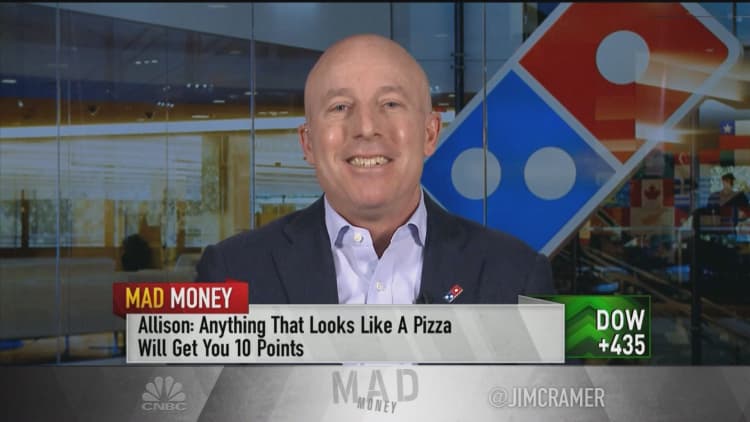Both Dunkin' and Yum Brands used their earnings conference calls Thursday to announce new developments in delivery.
Taco Bell, which is owned by Yum, is now delivering its food nationwide via Grubhub. Meanwhile, Dunkin' is dipping its toes into delivery by launching a small pilot, also with Grubhub, the market leader.
More and more restaurants are partnering with third-party delivery services as foot traffic stalls as a way to keep growing sales. Working with a third party means that restaurants can skip some of the hassle of delivery while still appealing to consumers who want more convenient food options.
But using those delivery platforms comes at a cost. High fees can reduce already low restaurant margins by as much as 30 percent. The largest delivery services typically charge restaurants commission fees of 15 to 30 percent per order. Restaurants also lose control over customer data and the quality of customer service.
McDonald's has expanded delivery to more than 19,000 of its global locations through a partnership with UberEats, which just celebrated its two-year anniversary. In the last two years alone, delivery has become a $3 billion business for the fast food chain.
However, McDonald's U.S. franchisees have expressed dissatisfaction with their returns on orders delivered by UberEats, adding it to a list of other corporate decisions the restaurant owners believe are not in their best interest.
Last year, the franchisees formed an independent organization called the National Owners Association to address their frustrations. A recent survey by the group found that 785 franchisees said they would support negotiations for better commission rates between Uber Eats and McDonald's, Skift Table reported. Uber Eats charges commission rates between 15 to 20 percent, according to Skift. In the survey, 565 operators said delivery was not generating a positive cash flow for their business yet.
"The company's position is that there is no additional labor required for Uber Eats. We beg to differ," the NOA board said in a post on the group's website. "Once you add labor into the equation, there is no cashflow for the owners."
Partnering with a delivery platform means that the restaurants are missing out on customer data. Most arrangements do not give the restaurants' access to data about what customers are ordering, Dylan Bolden, managing director at Boston Consulting Group, said.
Restaurants also lose control over the customer experience, but they're still on the hook when it comes to their reputation if customers' orders show up cold.
"The risks are – if you're a brand thinking about delivery – how can you control that experience if you're using a third party," Bolden said.
Starbucks, for example, has to make sure its drinks for delivery are hotter than normal to ensure that they reach customers at their usual temperature. The company has partnered with e-commerce giant Alibaba to deliver its drinks in China and is expanding its U.S. pilot program with UberEats. It started offering delivery in Chicago and Boston on Monday, joining three other cities.
The coffee giant is on track to reach its goal of offering delivery in nearly a quarter of its stores by this spring, but it's still adjusting to the changes that come with delivering its hot and cold drinks. In China, customers have an average wait time of 19 minutes. The company is also considering changing up its menu of drinks available for delivery, Rosalind Brewer, Starbucks' chief operating officer, told analysts on its latest quarterly conference call.
Even with commission rates and delivery costs, Bolden still believes delivery is a good financial idea for most restaurants, as long as the demand is incremental. He said for most restaurants, delivery demand is about 75 percent incremental.
He worked with sandwich-maker Jimmy John's, which has been delivering its food with its own drivers for 36 years, to decide if the company should consider outsourcing its delivery. The sandwich company, which employs more than 45,000 delivery drivers nationwide, decided that switching didn't make sense.
For the restaurant chains like Jimmy John's that have been handling their own delivery for decades, they're mostly sticking to business as usual.
Domino's CEO Richard Allison said on CNBC last month that the pizza chain only wants to hire its own drivers to retain control over quality and customer experience.
Instead of switching to a third-party service, Domino's is making investments in its delivery. To shorten the average delivery time, the company has been opening more locations across the country, a strategy that it's calling "fortressing."
Jimmy John's is even using its decision to handle its own delivery orders to kick off a national advertising campaign this week.
"When you look at the key things that customers care about with speed, care and accuracy, the study showed that we win on all of those things," John Shea, its chief marketing officer, said. "We gotten this advantage that we've built up over the last 36 years."
Long-term, Bolden predicts that some restaurants will choose to leverage third-party platforms for last-mile delivery only. Chipotle has already started to do that, using Doordash to drop off customers' burritos after they are ordered on the Mexican food chain's app.



